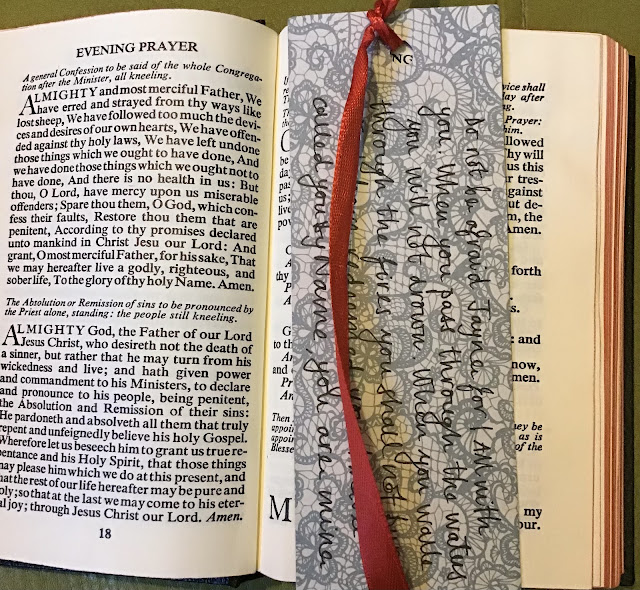Transition: A sermon for the fourth Sunday of Advent in 2020
Luke 1: 26-38
Have you ever suffered from Imposter Syndrome? That psychological mind trick which convinces you everything you’ve ever achieved is down to nothing more than luck or chance? You doubt your skills or talents and are convinced that at any moment you might be unmasked as the fraud you undoubtedly are.
Have you ever suffered from Imposter Syndrome? That psychological mind trick which convinces you everything you’ve ever achieved is down to nothing more than luck or chance? You doubt your skills or talents and are convinced that at any moment you might be unmasked as the fraud you undoubtedly are.
I confess that this fear plagues me from time to time, usually after I’ve been asked to do something special or out of the ordinary. When I have to step up and deliver on someone’s expectations of me it is then that a sly, pernicious voice in my head might say, ‘Me? Who am I to be asked to do this?’
It takes conviction and courage to ignore that voice and to instead emphatically, defiantly declare: Why not me?
Fellow imposters, I invite you to take comfort in today’s gospel reading. A story of the foretelling of Jesus’ birth and a fleeting case of Imposter Syndrome.
This encounter between Mary and the Angel is a parallel to John the Baptist’s origin story, which we read about in the previous chapter. Elizabeth, the mother of John – a high-class aristocrat from the hill country, married to a Priest; contrasting with Mary, an unmarried young girl from a backwater called Nazareth. And yet, despite the disparities in class and status Elizabeth’s baby would grow up to be unworthy to even untie the sandals of Mary’s baby.
It’s a story of a king, turned on its head. Our Gospel writer Luke, takes his time over the narrative of Jesus’ birth because the central message of his gospel is to illuminate who Jesus was and is from the ground up. It was written at a time rampant with eschatological hope and anticipation; a time when people were deeply concerned with questions of death, judgement, and the final destiny of humankind. Very 2020 questions, one might say. How and when will all this end? Will life always be as hard as this? When will we be saved?
Luke wants to reveal who Jesus is and he does that by smashing the socio-political assumptions of the day and turning them upside down. Jesus, the saviour will come but not in the way you think he will. Throw all your theories aside, because this man is unlike anything you’ve ever seen before. How do we know this? We know because Luke shows us who his mother was.
Mary is female, at the time seen as lesser humans because they were merely underdeveloped males. She has very few legal rights and she has no power. Mary is young, little more than a child. Relationships at this time were codified by ingrained patriarchal norms, so it was usual for much older men to be betrothed to very young girls. She is inexperienced and uneducated. Mary is from Nazareth, a secluded village far from where the powerful reside. She has no authority or freedom.
No wonder she responds to the Angel’s proclamation with the response: ‘Me? Who am I to be asked to do this?’
Mary is nothing and yet God asks her to carry everything.
I wonder, how many times have you felt unequal to the many challenges we’ve faced this past year? How many times have you been afraid? How many times have you felt overwhelmed? How many times have you uttered the words, in your own head or out loud: How can this be? I cannot do this.
On this fourth Sunday of Advent we think of Mary, that obedient carrier of hope, so glorious in her humble ordinariness. There’s something so beautiful and poignant about the hope of the world from on high, residing inside the body of someone down so low. And yet, this is the way of God: divine purposes achieved through the powerless not through princes.
Today we look forward to the coming week, to Christmas Day and to Mary labouring in a stable. We look beyond; to rebirth and new life. But before birth can come there is always struggle and pain.
Just before a woman gives birth there is a terrifying moment, right before she feels the relief that comes with the urge to push. This process is called transition. It marks the moment when the woman’s body is fully dilated and she’s ready to push, to literally bring new life into the world.
Transition is marked by a feeling of utter despair and total exhaustion. It’s when contractions come so thick and fast that you can’t think of anything but the pain. It’s the moment during childbirth when a woman will scream, ‘I can’t do this anymore!’ And then, right then in that apparent void of hopelessness, in the eye of that dark, unstoppable storm, that’s when the relief of the urge to push comes, heralding the end and the beginning and the new life that soon follows.
I believe this moment we are living through now is transition. Those feelings of despair and sadness, of bone-deep weariness and despondency, they are markers that hope is near. That an end is in sight. That new life is coming.
There are no imposters with God, friends. No frauds, no mistakes. Only choices and chances to trust in God and like Mary, to say yes, I am yours. Do not be afraid, the Lord is with us. And no word from God will ever fail.




Comments
Post a Comment